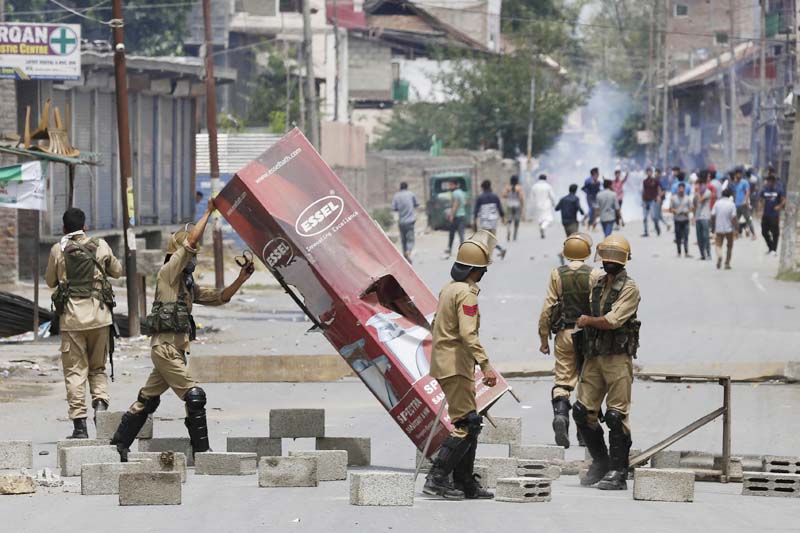Death of rebel leader fuels renewed anger in Kashmir
SRINAGAR: When Indian forces announced last week that they had killed a top Kashmiri rebel leader, they called it a major victory in the fight against militants in the disputed Himalayan region. They clearly didn't expect the backlash that followed — an outpouring of public anger, daily protests and dozens dead in the streets.
The killing of Burhan Wani drew tens of thousands to rise up and renew demands for "azadi," or freedom, from Indian rule. At least 29 people have died in clashes and hospitals are struggling with hundreds of injured.
Each day this week has brought a new surge of resistance by young, rock-throwing protesters in jeans and bandanas defying curfews to face down Indian troops firing live ammunition, pellet guns and tear gas.
Officials worry that they've unwittingly revived a rebellion that may be hard to control.
"We were not expecting this huge public reaction," said a top security official engaged in counterinsurgency operations, speaking on condition of anonymity as he was not authorized to speak to reporters. "It's disturbing."
There were clear signs that the mostly Muslim region was ripe for a renewed rebellion even before the death of the popular, young leader of the area's largest rebel group.
Wani had been hidden by villagers at least half a dozen times before, as have other anti-India rebels, when soldiers zeroed on their hideouts in southern Kashmir villages, according to security officials and local residents. Many among Kashmir's 12 million people saw the 22-year-old handsome Wani as a folk hero who bravely defied India's forces, marked by hundreds of thousands of troops in the disputed region.
Many felt as if they knew Wani personally, having followed the news of his rise through the ranks of Hizbul Mujahideen.
When news spread that Indian troops had killed him and two other militants Friday night, the response was immediate: Tens of thousands of angry youths poured out of their homes in towns and villages, hurling rocks and bricks and shouting at Indian troops in the streets.
Wani's "ability to recruit (people) into militancy from the grave will far outstrip anything he could have done on social media," Kashmir's former chief minister and opposition leader Omar Abdullah tweeted on Saturday.
Inspector-General Syed Javaid Mujtaba Gillani described Wani's killing as the "biggest success against militants" in recent years.
Authorities imposed a 24-hour hour curfew, but still protesters attacked military and paramilitary installations, burned several police stations and some homes belonging to police and pro-India politicians.
"Despite 69 years of opportunity, India has not earned Kashmiri trust," Indian author-journalist Aditya Sinha said in a column published this week in the Mumbai-based daily Mid-Day. He wrote that India's focus on Wani having been a militant was "ironic, given that India has turned the Valley into a part-garrison, part-open air prison."
Prime Minister Narendra Modi, having just returned from a four-nation tour in Africa, called a high-level government meeting to discuss how to restore peace. Indian authorities said Monday they had sent at least 2,000 more law enforcement troops to the mountainous region, where hundreds of thousands already are deployed permanently.
Kashmir has known little other than conflict since 1947, when India and Pakistan gained independence but were unable to resolve their rival claims to the mountain territory. Since then, the countries have fought two wars over those claims, which each controlling a part of the region.
The Indian side has seen several separatist movements, including a bloody armed rebellion launched in 1989 to demand independence or a merger with Pakistan. More than 68,000 people were killed in that uprising and the subsequent brutal crackdown by hundreds of thousands of Indian forces deployed across the region.
Wani was born in the southern town of Tral and was a teenager in 2010 when his older brother was beaten by troops on patrol near their home. Shortly after he joined Hizbul Mujahideen, then a deflated band of rebels on the run from Indian forces, and eventually became the iconic face of Kashmir's militancy, using social media to rally supporters and reach out to others who had grown up like him in the militarized and job-scarce region.
"People identified with him as his message was loud and clear — no more subjugation and brutalization. He would use Facebook more than guns," said human rights activist Khurram Parvez.
In an unprecedented outpouring of support, tens of thousands of Kashmiris defied a curfew to crowd around Wani's funeral in Tral, chanting "We want freedom." As his body was being lowered into the grave, two militants fired pistol rounds into the air.
The funeral was the "people's referendum against Indian rule," Parvez said.
Activists have since painted anti-India slogans on shop shutters and walls across Srinagar, the region's largest city.






